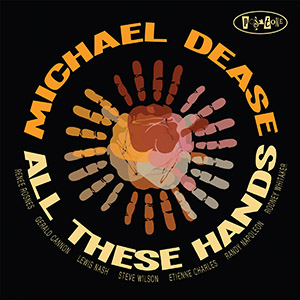 Michael Dease’s humanity comes pouring out of his trombone on All These Hands (Posi-Tone Records). His 12 original, straight-ahead compositions trace the story of the spread of jazz across the United States, paralleling the African-American migration from the South up through the Midwest and the Eastern Seaboard and reflecting the musical character of different cities and regions. Upbeat, open, and curious, Dease sings on his horn with a near-human vocal quality that makes this a personal and intimate statement from top to bottom. He is accompanied by a stellar cast, including Rene Rosnes (piano), Gerald Cannon (bass), Lewis Nash (drums), Steve Wilson (flute, alto and soprano saxes), and Etienne Charles (flugelhorn, trumpet). Special guests help out on several tracks, most notably guitarist Randy Napoleon on “Delta City Crossroads,” a soulful blues duet with Dease, and bassist Rodney Whitaker, who closes the album with a solo piece, “Up South Reverie,” a powerfully emotional performance that encapsulates the anger, displacement, perseverance, and hope in the African-American history. Among the numerous highlights are the dancing, big-band feel of “Territory Blues;” the sweet swing of “Benny’s Bounce,” which references Benny Golson’s “Along Came Betty” in homage to Philadelphia and which benefits from the light but propulsive touch of Nash on the drum kit; the party-hearty “Memphis BBQ and Fish Fry,” with its foot-tapping funk; and the sunny “Chocolate City,” which celebrates the role of the train.
Michael Dease’s humanity comes pouring out of his trombone on All These Hands (Posi-Tone Records). His 12 original, straight-ahead compositions trace the story of the spread of jazz across the United States, paralleling the African-American migration from the South up through the Midwest and the Eastern Seaboard and reflecting the musical character of different cities and regions. Upbeat, open, and curious, Dease sings on his horn with a near-human vocal quality that makes this a personal and intimate statement from top to bottom. He is accompanied by a stellar cast, including Rene Rosnes (piano), Gerald Cannon (bass), Lewis Nash (drums), Steve Wilson (flute, alto and soprano saxes), and Etienne Charles (flugelhorn, trumpet). Special guests help out on several tracks, most notably guitarist Randy Napoleon on “Delta City Crossroads,” a soulful blues duet with Dease, and bassist Rodney Whitaker, who closes the album with a solo piece, “Up South Reverie,” a powerfully emotional performance that encapsulates the anger, displacement, perseverance, and hope in the African-American history. Among the numerous highlights are the dancing, big-band feel of “Territory Blues;” the sweet swing of “Benny’s Bounce,” which references Benny Golson’s “Along Came Betty” in homage to Philadelphia and which benefits from the light but propulsive touch of Nash on the drum kit; the party-hearty “Memphis BBQ and Fish Fry,” with its foot-tapping funk; and the sunny “Chocolate City,” which celebrates the role of the train.
Tag: Lewis Nash
Through struggle came this joyful, triumphant music – “All These Hands” – by Michael Dease
 For Michael Dease’s 10th album and fourth for Posi-Tone Records, the trombonist, composer and bandleader chooses to take us on a trip. An historical trip with twelve stops, that is, and the mode of transportation is his music.
For Michael Dease’s 10th album and fourth for Posi-Tone Records, the trombonist, composer and bandleader chooses to take us on a trip. An historical trip with twelve stops, that is, and the mode of transportation is his music.
All These Hands, out January 6, 2017, examines the birth and development of jazz as it moved from its New Orleans cradle, up to the Midwest and over to the east coast, eventually establishing its headquarter at NYC. As Dease has noted, the migration of jazz around the USA mirrored the migration of African Americans in the early and middle 20th century, and so an examination of the music form can’t be separated from the larger cultural and social phenomenon. Dease’s music traces the transformation of the culture through the transformation of the music itself, providing his most varied set of tunes he’s yet presented.
Just What the Doctor ordered, “All These Hands”, by Michael Dease
 Gathering a hand picked bunch of all stars to make the trek with him as he brings his sound and vision to fruition, Dease and his bunch make a history of jazz recording that has no dust on it and sounds much more looking forward than looking backward. A dazzling set that’s striking in it’s ability to say something new here, this is more than a pleasingly swinging set that cooks. A solid work throughout, this is thoughtful jazz that doesn’t hesitate to cut to the chase and make it’s point. Exactly what the doctor ordered for that afternoon when you want to be alone with some jazz and let it roll. Killer stuff.
Gathering a hand picked bunch of all stars to make the trek with him as he brings his sound and vision to fruition, Dease and his bunch make a history of jazz recording that has no dust on it and sounds much more looking forward than looking backward. A dazzling set that’s striking in it’s ability to say something new here, this is more than a pleasingly swinging set that cooks. A solid work throughout, this is thoughtful jazz that doesn’t hesitate to cut to the chase and make it’s point. Exactly what the doctor ordered for that afternoon when you want to be alone with some jazz and let it roll. Killer stuff.
